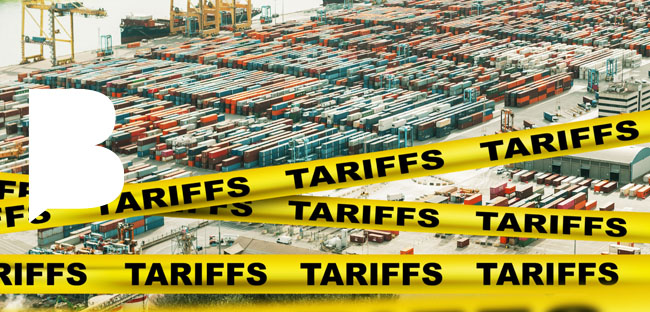

Dear readers,
Last week brought tectonic shifts in the global economy following the US tariffs dismantling the existing trade order. So far, the tech and digital sectors have been indirectly affected mainly by the price increase of hardware components, including semiconductors and servers, imported from China, Taiwan, and Vietnam. Apple and Samsung already announced a rise in the prices of smartphones.
However, the impact on the US tech sector and the global digital economy can worsen if the trade war escalates. In such a scenario, the European Union and other countries will likely introduce digital services taxes and stricter regulations of the US tech giants, as analysed by Jovan Kurbalija in Algorithms confront tariffs: A hidden digital front in an emerging trade war.
Forthcoming economic uncertainty may lead to a rise in the value of Bitcoin as a safer than other options for saving wealth and investment.
TikTok bidding war intensified as Amazon entered the fray with Trump’s last call to resolve TikTok’s future. However, the TikTok deal stalled amid US-China trade tensions.
Amid geopolitical tensions, cybersecurity has risen in relevance. The UK and Japan passed new cybersecurity bills that protect critical infrastructure. As of 1 April, Switzerland requires critical infrastructure operators to report cyberattacks within 24 hours to the National Cybersecurity Center.
The pushback against strict AI safety regulations continues as the industry has lobbied South Korea for a less strict AI Basic Act than the European Union.
Microsoft is scaling down the development of new AI data centres as a sign of lower dynamism in this field and precautionary measures against AI bubble.
Ghibli-style images overwhelmed OpenAI servers and OpenAI layers as they opened the question of copyright breaches. The EU AI Act’s Code of Practice clarified the regulation of using copyrighted materials to develop AI models.
For the main updates and reflections, consult the Radar and Reading Corner below.
DW Team
RADAR
Highlights from the week of 28 March – 4 April 2025
Coimisiún na Meán, leading DSA enforcement in Ireland, faces varying interpretations of the law among EU members, making a unified approach crucial to regulation.
Notable authors such as Kate Mosse and Tracy Chevalier are participating, with the demonstration organised by the Society of Authors (SoA).
US lawmakers are advancing stablecoin legislation aimed at increasing transparency, securing reserves, and strengthening the dollar’s role in digital payments.
The logical and analytical foundations laid by the Lwów–Warsaw School significantly support both the technical and ethical dimensions of AI transformation.
Key interested parties now include Amazon too, expressing its interest in line with its social media expansion ambitions, and a consortium led by OnlyFans founder Tim Stokely, proposing a model…
The Active Cyber Defence Bill would enable pre-emptive and active cyber measures by military and law enforcement, mandating incident reporting from critical infrastructure, and allowing limited data collection to monitor…
What started as a fun artistic trend has quickly turned into a technical nightmare for OpenAI, with its CEO pleading for a break as servers buckle under pressure.
Talks about spinning off TikTok’s US operations have hit a wall after China signalled disapproval following President Trump’s new tariff hikes.
Big Tech’s energy needs are pushing the nuclear renaissance as AI models become increasingly power-hungry.
READING CORNER
President Trump’s tariffs on goods have intensified global trade tensions, notably with the EU. However, they largely ignore the critical sector of digital services, where the US holds a strong advantage. In response, European nations have proposed digital services taxes (DSTs) aimed at American tech giants, framing them as necessary for fiscal fairness. The collapse of OECD negotiations has prompted unilateral digital taxes across various countries, escalating the trade conflict. This shift towards digital taxation could redefine international trade diplomacy, posing challenges for US tech dominance and potentially leading to retaliation that affects both goods and digital markets.
The concept of digital sovereignty has gained prominence. This discussion examines the tension between territorial politics and transborder digital operations, highlighting how demands for autonomy reflect a desire to navigate external influences within an interconnected digital landscape. As sovereignty claims become entwined with security narratives, the necessity to socially anchor digital sovereignty policies is emphasized.
The Lwów–Warsaw School of Philosophy, a pioneering movement in Polish thought, has made lasting contributions to philosophy highly relevant to modern AI. The school’s work in logic and semantics provides essential tools for AI, while its analytical approach offers insights into ethical challenges.
An ermine plays peek-a-boo from a rotting tree. Cute? Maybe. But it might also be a calculated survival tactic. Aldo Matteucci explores provocation in the wild – and its unsettling parallel in human behaviour.
How Ghibli-inspired AI art went viral, exploring mainstream AI trends, creativity impact, and ethical concerns raised by Hayao Miyazaki.
UPCOMING EVENTS
The twenty-eighth session of the Commission on Science and Technology for Development (CSTD) will take place from 7 to 11 April 2025.
The briefing will discuss the role of civil society organisations in digital governance and AI developments.
Jovan Kurbalija will discuss how AI can help African development and preservation of local knowledge and traditions.



















